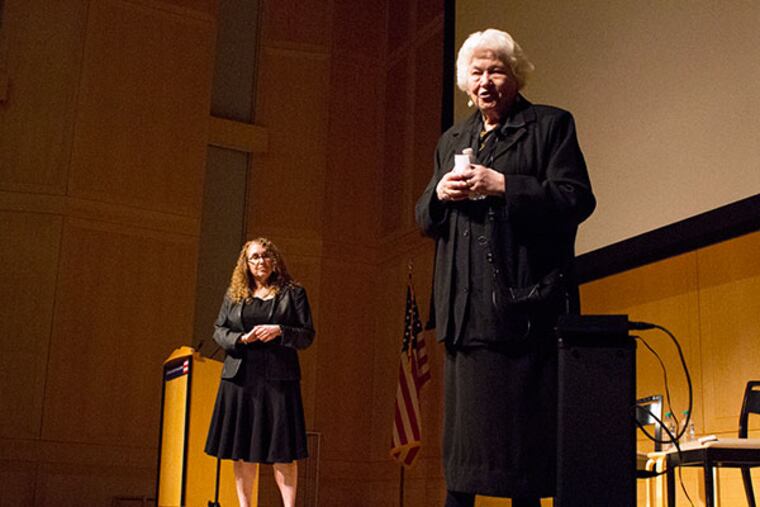A Holocaust survivor's passion for civil rights
The remarkable Holocaust survival story of Judy Meisel could have ended on May 5, 1945 - the day the emaciated 15-year-old Lithuanian boarded a boat for freedom in Denmark, after running away from a German death march and hiding in a ditch with her sister.

The remarkable Holocaust survival story of Judy Meisel could have ended on May 5, 1945 - the day the emaciated 15-year-old Lithuanian boarded a boat for freedom in Denmark, after running away from a German death march and hiding in a ditch with her sister.
But that was only the beginning of Meisel's odyssey. After settling in Mount Airy in 1950, she said, her lingering sense of injustice inspired a new path as a civil rights activist - breaking bread with the Rev. Dr. Martin Luther King Jr. and racing to the aid of an African American family at the center of a 1963 race riot in Delaware County.
Television images of a mob that tried to prevent Horace and Sarah Baker from moving into an all-white section of Folcroft stirred up old feelings and also frightened her - "after what I went through with the Holocaust, to see what was happening," said Meisel. She was in Philadelphia on Monday to mark Holocaust Remembrance Day at the National Constitution Center, where she talked to students and showed a harrowing documentary of her life. She planned to bring the program to Delaware County schools, including Penn Wood, Springfield, and Archbishop Carroll High Schools, this week.
But the visit also was a chance for a reunion with the Bakers' 49-year-old son, Alex, whom she had not seen for decades. He and her children grew up together in the late 1960s and '70s in Mount Airy, where the Bakers had moved, in part at Meisel's behest, when the Folcroft harassment became overwhelming.
Seeing Alex Baker again, she said, was the highlight of a week that was a family reunion for her, her three grown children, and five of her six grandchildren. Baker and her family members got together on Friday. "It was nice for my kids to see him," she said. "They used to be so scared when I would go to his house" in Folcroft.
The day in August 1963 when she made a tray of cookies for the Bakers and braved the rabble that yelled "white trash" at her was the beginning of their friendship as well as her activism in the Holocaust-remembrance movement. She says her experiences in Folcroft were what persuaded her to shed her reluctance to talk about the genocide.
Meisel, now 85 and living in California, did not learn the whereabouts of Alex Baker, now a transportation specialist living in Maryland and a married father of two, until an article about the 50th anniversary of the Folcroft incident in which he was quoted was published last year in The Inquirer.
The Folcroft incident and the Bakers played such an important role in Meisel's evolution as a Holocaust activist that the Baker saga opens the award-winning 2000 documentary about her life, called Tak for Alt (Thanks for Everything in Danish). She now shows the film as part of her lectures to schoolchildren, and invariably the first question is, what happened to the Bakers? - "Now I know!" she said.
Yesterday, Baker and Meisel were to meet at the Constitution Center to speak about their shared experience, but he had to leave Sunday because of the sudden death of his father-in-law. Instead, Meisel shared her own narrative to students from the Delcroft School in Folcroft, Penn Wood Middle School in Yeadon, and Motivation High School in Philadelphia.
In all, 146 of Meisel's relatives were killed in the Holocaust, including her mother, who died in a gas chamber at the Stutthof concentration camp. She and her sister, who were also at the camp, eventually escaped to Denmark. Her brother was sent to Dachau and survived.
A nursery-school teacher quietly raising her children in Mount Airy, Meisel said she was reenergized watching black Americans fight for their rights.
"Civil rights was a wake-up call," she said, recalling how she not only joined King's 1963 March on Washington but met the legendary activist twice in Philadelphia.
Her message about the common cause of Jews and African Americans seeking liberty and justice still resonates a half-century later.
"It was very healing to me that I survived and could help another human being," Meisel said. "Civil rights was the greatest thing for me."